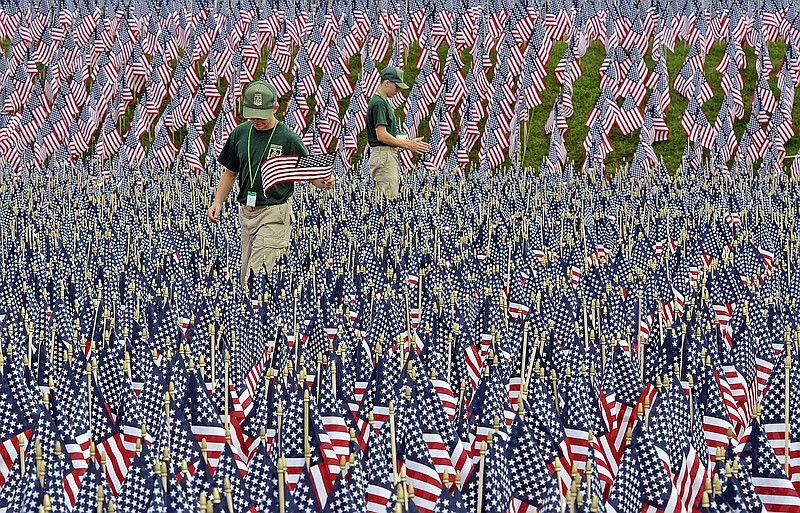Memorial Day is a good and proper time to ask: Can war ever end?
"Absolutely," said one friend, a Marine, who now works with the Wounded Warrior Project. "Look at Europe."
Seventy years ago, Europe was writhing in nation-state warfare. Had you gone to Berlin or Warsaw or Normandy in 1944 and asked if European nations would one day live together in peace, people would have said you were drunk with delusion.
Yet today, a European Union holds together the very same countries that once firebombed each other. There is trade, democracy, common currency, open borders and shared government.
The lesson of then-to-now Europe teaches us that war never has the last word.
We can apply the same history of transformation to the Middle East. Now soaking in conflict, the region has the potential to unify itself in the coming decades. I don't say this lightly; the depth of the violence and hate is profound. Yet the human heart and its ability to transcend are more so.
Memorial Day asks us to recognize this. It is a holiday with two faces. One asks us to look backward, in memoriam, at our nation's soldiers, both living and dead.
Yet we are obligated also to look forward, with intention and deliberation, with a desire to craft a future better than our past. We are called to debate and study the nature of warfare.
Do we have to fight?
Currently, it has become politically en vogue -- sort of campaign trail fashion -- for Republican presidential candidates to debate whether invading Iraq was a good idea.
* "We have to question: is Iraq more stable or less stable since Hussein is gone? Is there more chaos or less chaos? Is ISIS more of a threat now because of the instability?" -- Sen. Rand Paul
* "If you fought in Iraq, it worked. It's not your fault it's going to hell. It's Obama's fault. You did your job." -- Sen. Lindsey Graham
* "They want to bring back a 7th century version of jihad. So here's my suggestion. We load up our bombers and we bomb them back to the 7th century." -- Rick Santorum
To debate the Iraqi War now, more than a decade after it began, is a dangerous misuse of context, suggesting that it is only in hindsight we can see the truth. In other words, debating the war now, today, muddies the fact that wisdom was available at the time -- there, in the hotness of post 9/11 America -- for all who sought it.
We didn't have to wait until 2015 to know the Iraq War would be a wreckage.
We could have foreseen it then.
One woman did.
There are 535 members of the U. S. Congress. When George W. Bush asked for war powers to seek revenge on those responsible for 9/11, every senator and Congress-person said yes, save one.
Rep. Barbara Lee, from California.
On Sept. 14, 2001, she spoke out against the president's war plans, the only person in Washington to do so.
"September 11 changed the world. Our deepest fears now haunt us. Yet I am convinced that military action will not prevent further acts of international terrorism against the United States," she said on the floor of Congress.
What she said is wise, but not new. For eons, spiritual teachers have spoken of the spiral of violence, how cruelty begets cruelty begets cruelty. As the law of gravity holds true to the physical world, this is a law of the spirit: to wage violence is to bring it back upon yourself.
The only way to peace is through peace.
"War is not innate. We are not hardwired for war." writes John Horgan in his "The End of War."
As a University of Massachusetts professor and the director of Center for Terrorism and Security Studies, Horgan spends his life studying violence. War, he says, does not have to happen.
"War is not something that happens to us. We make it happen," he said. "War is not foisted on us by forces beyond our control, whether innate male aggression, competition for scarce resources or entrenched cultural attitudes. Wars all begin with human decisions."
In America, we have long labored over the belief that war is inevitable, an ugly yet inescapable part of our national fiber. At some point, this belief will either doom us, or propel us to into an enlightened search for something more hopeful and lasting. There are legions of nonviolent scholars, history-makers and freedom fighters that can guide us.
"From prehistory up through the present, many societies have resisted the allure of war and militarism, belying the notion of a biological drive or an instinct that impels us to fight," Horgan writes.
There are libraries of historical examples -- plenty of ways, for example, how nonviolence stopped Nazism -- to the science of compassion, which shows how our truest selves are not rooted in animosity, but cooperation.
"I believe war will end for scientific reasons," Horgan writes. "I believe war must end for moral reasons."
Contact David Cook at dcook@timesfreepress.com or 423-757-6329. Follow him on Facebook at DavidCookTFP.

